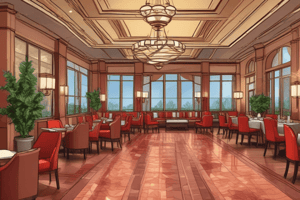Podcast
Questions and Answers
Which ancient civilization is credited with inventing 'thermal baths' for relaxation and recuperation?
Which ancient civilization is credited with inventing 'thermal baths' for relaxation and recuperation?
- Greeks (correct)
- Jews
- English
- Romans
What was the name of the first hotel that existed in the 16th century?
What was the name of the first hotel that existed in the 16th century?
Hotel de Henry
A hostel is a type of lodging supervised by adults for young hikers and travelers.
A hostel is a type of lodging supervised by adults for young hikers and travelers.
True (A)
A pension home is a family-operated tourist boarding house providing rooms and other common facilities to guests such as toilets and __________.
A pension home is a family-operated tourist boarding house providing rooms and other common facilities to guests such as toilets and __________.
What is the difference between fast food and fast casual restaurants?
What is the difference between fast food and fast casual restaurants?
Fine dining restaurants typically have specific dedicated meal courses.
Fine dining restaurants typically have specific dedicated meal courses.
What is the primary function of the front office department in a hotel?
What is the primary function of the front office department in a hotel?
The primary function of a concierge is to serve as guests’ liaison for both hotel and __________ concerns.
The primary function of a concierge is to serve as guests’ liaison for both hotel and __________ concerns.
Match the front office personnel with their roles:
Match the front office personnel with their roles:
Flashcards are hidden until you start studying
Study Notes
History of the Hospitality Industry
- Caring for travelers has been a fundamental element of civilized societies since ancient times.
- Hospitality became a worldwide phenomenon, reflecting basic humanity.
- Early accommodations were popular due to social and religious travel.
- Greeks invented thermal baths for relaxation and recuperation.
- Romans were the first pleasure travelers, leading to the development of early inns.
- During the Medieval period, English travelers started to flourish, and inns were built out of private homes.
- The Renaissance period saw high demand for inns and taverns, with the first hotel, Hotel de Henry, and the invention of coffeehouses in Livorno, Venice.
- In the 18th century, the concept of eating and sleeping in one place or establishment emerged in North America and the British Isles.
- The French Revolution led to the emergence of restaurants, and chefs migrated to the New World, changing the course of culinary history.
Definition and Characteristics of Hospitality
- Hospitality is often defined as the quality or disposition of receiving and treating guests/customers in a warm, friendly, and generous manner.
- It is not just about what you do, but about the nature of your thinking when you interact with guests.
- Hospitality is an innate quality of all human beings and cannot be taught.
- Characteristics of hospitality include:
- Respectful
- Present
- Responsive
- Personal
- Non-judgmental
- Non-intrusive
- Relaxed
- Personable
- Perceptive
- Consistent
- Appropriate
- Uplifting
- Surprising
Hotel Departments
- Hotel departments are categorized into two:
- Operational departments (core departments):
- Front Office
- Food and Beverage Service
- Housekeeping
- Food and Kitchen Production
- Administrative departments (non-core departments):
- Maintenance Department
- Accounting Department
- Human Resource Department
- Electronic Data Processing Department
- Communication Department
- Security Department
- Purchasing Department
- Sales and Marketing Department
- Operational departments (core departments):
Hotel Management Structure
- A comprehensive plan by a hotel owner to define departmental activities and responsibilities.
- It brings order to every aspect of hotel operations and ensures maximum profitability.
Skills Required for Hotel Management Professionals
- Communication skills
- Leadership skills
- Sales ability
- Time management
- Basic knowledge of computers
- Public relation skills
- Negotiation skills
- Multi-tasking skills
- Team management skills
- An eye for detail
- Marketing skills
- Stress handling skills
- Personal grooming
- Swimming
Overall Prospect of Hospitality Management
- Career opportunities in various industries, including:
- Airlines catering
- Banks or other financial sector
- Cabin crew in airlines
- Call centers
- Clubs
- Cruise liners
- Educational institutions
- Fast food joints
- Hospital administration and catering
- Railways catering
- Recreation and health centers
- Telecom industries
- Restaurants
- Tour and travel companies
Types of Lodging Accommodations
- Various types of lodging accommodations, including:
- Aparotel/Aparthotel
- Backpackers
- Bed and Breakfast
- Boutique Hotel
- Budget Hotel
- Camping Park
- Campus Accommodation
- Condotels
- Guest House
- Holiday Park
- Hotel
- Hospice
- Hostel
- Inn
- International Resort Hotel
- Lodge
- Motel
- Pension Home
- Private Home
- Transient House
- Resort
- Serviced Apartments
Hotel Classifications and Standard Requirements
- Classification of resorts
- Types and variations of restaurants, including:
- Fast food
- Fast casual
- Casual dining
- Family style
- Fine dining
- Variations of restaurants, such as brasserie and bistro, buffet and smorgasbord, cafe, cafeteria, coffeehouse, destination restaurants, tabletop cooking, Mongolian barbecue, pub, and teppanyaki style
Hotel Ownership and Affiliation
- International corporate hotels
- Major national hotel companies
- Small hotel groups
- Independent hotels
- Hotel consortium
Introduction to Front Office
- Main functions of the front office department, including:
- Reservations
- Registering guests
- Assigning rooms to guests
- Source of information
- Roles of the front office personnel, including:
- Front office manager
- Front desk agent
- Reservations agent
- Front office cashier
- Concierge
- Bellhop service
- Switchboard operator
- Night auditor
Studying That Suits You
Use AI to generate personalized quizzes and flashcards to suit your learning preferences.



